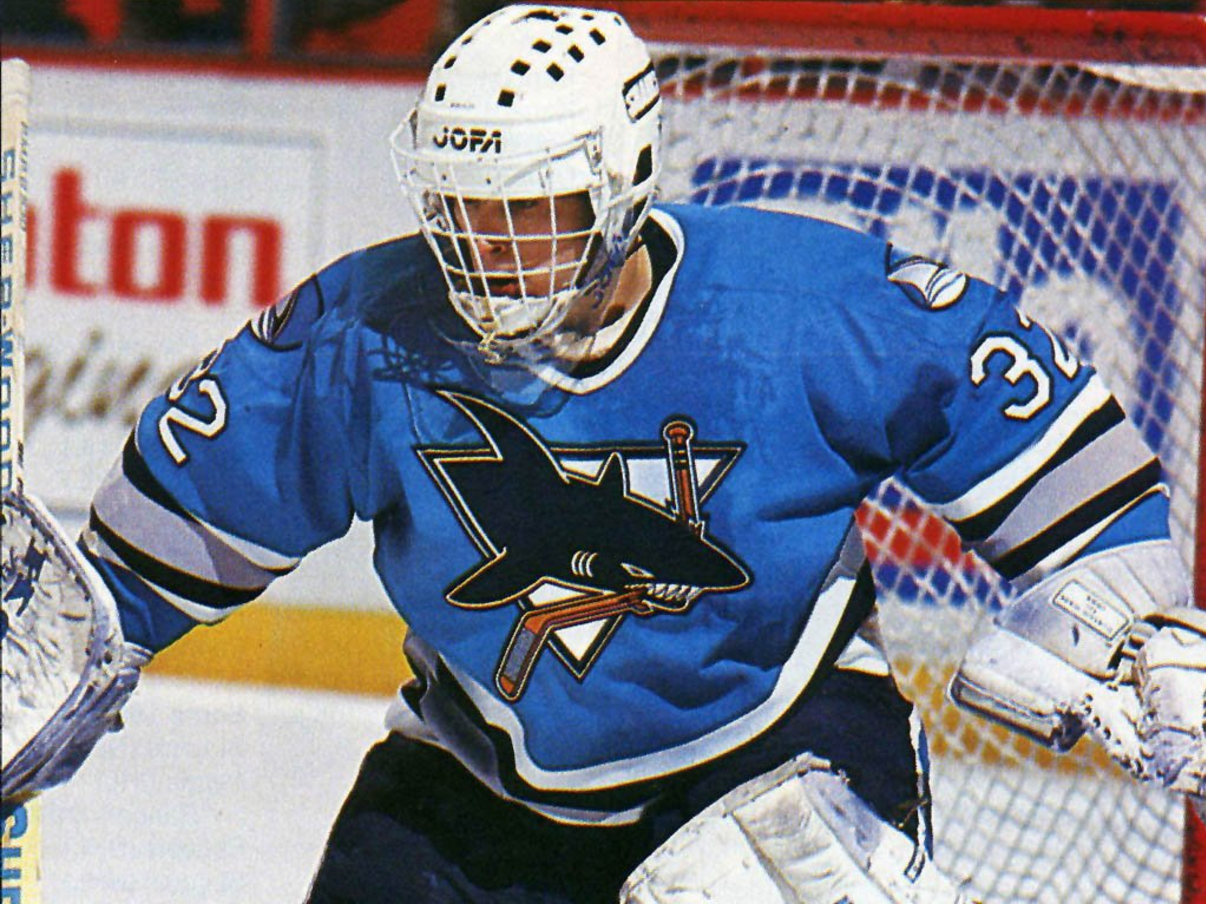SAN JOSE — “Like Wall.”
Arturs Irbe remembers the t-shirts and the handmade signs, and he remembers the spring when a Northern California Sunbelt town fell in love with its hockey team, just as Gary Bettman told us it would.
Irbe — pronounced ‘EARRRR-bay’ my Latvian aunt Velta always reminded, rolling her tongue for effect — can’t remember the first time it actually struck him that the Latvian translation for standing on one’s head was “Like Wall.”
“I wasn’t that worried to chat up the press in my hey day. I was chatty,” Arturs said over the phone on Friday. “There was this love story between the team and the town of San Jose. We were new to the people, and I would get all kinds of different questions: ‘How did I make this save?’ ‘How did I accomplish what I did in this game?’ In English, our players would (talk about) ‘standing on the head.’”
This term was as new to Irbe as hockey was to the Silicon Valley. The Sharks had joined the National Hockey League in 1991, but they’d played their first season in the old Cow Palace in Daly City outside San Francisco, a California rodeo arena that still smelled of prosperity (read: horse manure) long after the prosperity had left.

Now they had opened the new, state-of-the-art building right on Santa Clara St. in downtown San Jose, with Igor Larionov, Sergei Makarov, Ray Whitney and Pat Falloon — and this little goalie who vowed to keep Los Tiburones in contention as long as it took for the locals to figure out what a two-line pass was.
“Standing on the head?” Irbe thought when he’d leave the rink. “This was not the same language. In Latvian they would say, ‘You were like wall.’ Impenetrable to get through.”
One day it dawned on him: “The expression ‘standing on the head’ was similar to ‘like wall’! That’s how it started. It was a translation from Latvian.”
Like Wall became a rallying cry for that Sharks team, and boy, did they rally. In the spring of ’94 San Jose came in as an eighth seed and defeated the No. 1 seed Detroit Red Wings in Round 1, a loss credited with the death of the old rule whereby the higher seeded club could choose a “two-three-two format” in any series between teams from the Eastern and Pacific time zone.
They would lose Round 2 in seven games to the Toronto Maple Leafs, a series the Sharks let get away.
Today, Irbe — who was let go as the Buffalo Sabres goalie coach along with head coach Ted Nolan after last season — sees a San Jose team with a goalie named Martin Jones, whom nobody knows much about. A goalie who might finally finish a job that Irbe and names like Link Gaetz and Johan Garpenlov had begun back in 1991.
“The more I watch Jones, there is some resemblance to Carey Price. Something about his movement, how smooth it is. It’s very impressive,” said Irbe, who would love to catch on with another NHL organization.
Jones is that goalie who came off the end of the Los Angeles Kings bench, like Jonathan Bernier and Ben Scrivens before him, that left us to wonder. We never knew how good any of Jonathan Quick’s backups would be when their workload quadrupled as starters elsewhere, but it seems that of the three, Jones is the most legit.
“I did have a little bit of a history with him (from a World Championships stint),” Sharks coach Peter DeBoer said of Jones. “But the credit there goes to the scouts that identified him on such a small body of work at the NHL level, (who) saw the potential.
“More importantly, all those guys you mentioned have physical skills. I think it’s his mental ability, his composure, the attitude he brings to the rink, the way he can shake off tough moments, reset. That’s the stuff that I think separates goalies. He’s got that.”
Never drafted in the NHL, Jones takes back-to-back playoff shutouts into Game 4 Saturday — a franchise first for both the Sharks and the St. Louis Blues. He’s played every second for San Jose this post-season, and though Jones can’t carry Irbe’s Jofa cage in the quotes department, he may just be the one who finishes the job that Irbe so dearly wished to complete.
“I have always had a special place in my heart for the Sharks,” Irbe said. “The fans, I remember, they cheered us at the end of the season after a terrible, terrible showing. They still cheered us! Eventually they learned the ropes, but they never lost their loyalty to the team.
“The way the hockey (environment) was built, and how important it became for the area, the community deserves this. And the team? The way they play right now?”
Irbe is watching from Washington D.C., where he lives now. In a time when players wear so many jerseys that they often have no post-career allegiance to any of them, this little Latvian still has some teal in his veins.
“You know, I never got to reach the top. I was on the journey, all the way up,” he said. “My feelings, watching them… I don’t want to jinx them, but I would love to see them win.
“Good things happen to good people.”







